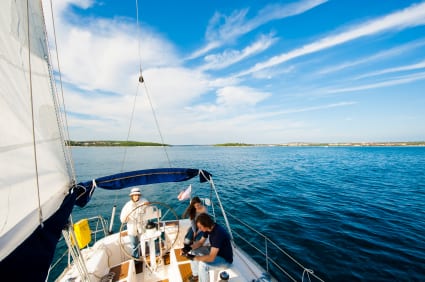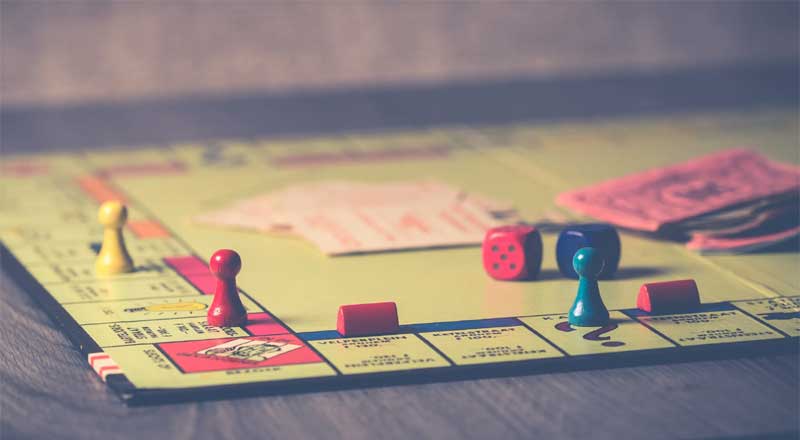My family was lucky enough to be invited by our in-laws to join them for a few days of sailing through the North Channel in Canada. My husband used to go on this same trip growing up and has told our kids many stories.

We were all excited for the adventure and there were lots of highlights. The kids spent quality time with their grandparents, our oldest learned the inner workings of the sail boat, we explored uninhabited islands, swam everyday and spent peaceful nights being rocked to sleep by the boat.
What I didn’t expect was how much we discovered about conservation from spending time on a boat. Even though it was a large, comfortable sail boat – with seven people on board and limited resources, we all learned some lessons that can make us more green in our everyday lives. As we drove home from the trip, I had my kids help me put together this list to reinforce what they learned:
1. There is limited water on the boat.
If you run out, there is no way to flush toilets, wash dishes, etc. Everyone on the boat is very conscious of how much water is being used because you can hear the water pump throughout the boat when someone is running the water. I learned to wash dishes using minimal water. I filled up a bowl with soapy water, washed all the dishes with the water off and then quickly rinsed them when I was done. The kids turned on the water to get their toothbrush wet and then remembered to turn off the water until they were done brushing. The faucets in the bathrooms had pressure sprays so when you turned on the water, nothing came out and you had to press a button to get the water to rinse your hands. That way there was no water running in faucets accidentally left running!
2. There is limited space for food storage and refrigerator space.
We only brought enough food to feed us for the days on the boat. There was there was very little storage and the refrigerator and freezer were both tiny. Most of us, when cooking for so many people, make too much so that we know that everyone will have all they want to eat. We might even feel that it’s an insult (when entertaining), not to have extras because that means that someon didn’t get seconds or thirds! When you are cooking on small surfaces (boat-side BBQ and a small stove top) and you are cooking for seven, you think about each person’s portion and only make that much. And it worked out great – it was nice to not have everyone overstuffed and food wasted.
3. You don’t need to shower every day.
Most of us, myself included, shower every day. While I know that people don’t NEED to shower everyday, I need a shower in the morning to wake up and feel refreshed. When you are on a boat and can’t use the water, you only shower when you are at a marina that has a shower. Plus, when you spend your days swimming in the Great Lakes, you probably don’t need to shower everyday. Although my kids were thrilled not to shower, it was harder for me. The lesson I learned on this trip was that I could go for a couple of days, wearing a pony tail and it didn’t kill me. It was probably good for my hair to not get stripped of all of it’s natural oil each day. However, I sure did run right to the shower whenever we reached a marina!
4. Less is more.
There is little storage for clothes and other personal items. We all learned to live with less of our stuff for a few days. All we really needed were a few outfits and a bathing suit. My kids are notorious for putting things in the laundry that aren’t really dirty. (I’ve even found clean laundry that made it’s way back into the hamper!) My kids think pajamas are dirty after wearing them for one night and towels are always thrown into the laundry after a single shower, no matter how many times I tell them that this isn’t necessary. When you have minimal clothes, you learn to wear the ones that aren’t TOO dirty again. You use towels for multiple days. When not given a choice, suddenly no one thought it was “gross”.
5. Learn to play with each other.
Without electronics and all of their normal toys, it was beautiful to see my kids just play with each other. They swam together. Played cards. Sang silly songs. It was sweet and nice to see they still had the ability to play.
6. Love and respect nature.
Our kids love to ski, hike, and bike and really have a love of the outdoors. With all that we do outside, there is no way to explain the beauty of nature like taking them on a Great Lake, exploring deserted islands, looking for fossils and picking blueberries right from the vine. I knew we were getting through to them when my electronics-addicted, “life is a destination” minded 13 year old just sat on a rock to take in his surroundings.
7. Limit our garbage.
When you live with your garbage until you reach land, you become very aware of how much you are throwing away and really try to limit it. We reused many things and re-purposed others into something new.
Although most of these things are common sense eco-friendly concepts that we tell our kids all the time, I was surprised that they viewed these lessons as limited only to our boat trip. I explained to them everything on the list is also something we should be aware of each day, because our resources are always limited. And there was a little glimmer of understanding.
Simply stating these things over and over wasn’t enough. Truly living with limited resources and space was what cemented these lessons in their brains. I can’t promise how long they will last but at least there was a brief “aha” moment out of each of them.





